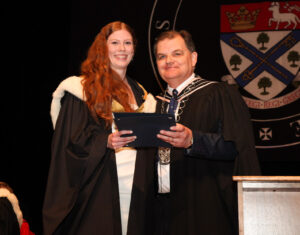When Alison Clarke was announced as the recipient of the King’s Medal at Encaenia on May 25, 2023, it was news to her just as it was to everyone sitting in the auditorium that afternoon.
“I had no idea. It was a total surprise,” Clarke explains. “It’s definitely nice to be recognized but again it’s very surreal. I don’t think it’s fully sunk in yet.”

The King’s Medal is awarded to the graduating student who stands highest in an arts or science honours program. Clarke graduated with first class honours in her Bachelor of Science degree with a combined honours in Physics and Mathematics. She is a Deane Little Scholar with an academic record that demonstrates a strong grade-point average throughout her studies at the University of King’s College.
Clarke came to King’s from Citadel High School. After attending open houses at several universities when she was in grade 11, she decided on King’s because she saw an opportunity to continue playing basketball. She also says she loved the feeling of King’s—how everything on campus is contained, and the university’s sense of community.
“Just picturing how my life would look … at each [university], I really thought King’s had it all. It had the community, it had basketball and through Dal it had courses and the research opportunities.”
Clarke liked the relationship between King’s and Dalhousie University. “It’s really great that that relationship exists because you kind of get the best of both worlds.”
In addition to being a strong student in the classroom, Clarke was also involved in various societies and communities, including the Dalhousie Undergraduate Physics Society where she was an executive for several years and the president in her final year. She was a member of King’s Finance Committee through the KSU where she reviewed and recommended various society applications for funding. Her volunteer work spanned membership of the American Physical Society’s Inclusion, Diversity and Equity Alliance Committee, where they encourage women and other minorities to go into STEM. She enjoyed mentoring younger students through various programs including the Dalhousie Science Society where they helped younger students navigate university, research and career development, and STEMpowerment Mentorship Program through STEM Fellowship, a Canadian registered charity that works to provides opportunities for students to learn about careers in STEM.
Clarke is also grateful for the summer research opportunities she was able to take advantage of at Dal. “It’s nice to be paid, and be paid for something that you’re learning and is actually relevant.” She says the summer research opportunities gave her a chance for career development. “The professors know that you’re just an undergraduate student, so it really is a learning experience. Learning the material, learning experimental research and yes sometimes even getting publications.”
She put this idea of career development to the test when, in 2020, she began a summer work term that focused on quantum-related research topics. The project involved carrying out numerical simulations of optically driven excitons in semiconductor quantum dot systems. Clarke’s contributions to the research project led to a publication in APL Photonic, a peer-reviewed scientific journal published through the American Institute of Physics. Clarke was listed as a coauthor. The publication garnered considerable international attention; a feat rarely achieved by an undergraduate student.
Among several scholarships, Clarke won the prestigious Burgess McKittrick Award from the Physics and Atmospheric Science department, which is given to the highest-ranked student in their first-year physics course. Clarke’s supervisor, Dr. Kimberley Hall, says, “Clarke has chosen a future path that combines her love for research and optics with her passion for the environment by pursuing solar cell research in her graduate studies in Physics at the University of Ottawa.”
Clarke says that her future graduate studies are “a great opportunity to sort of use the research I’ve done in the past but in a different way.”
At Encaenia, the audience cheered as Clarke stepped up on stage. She stood at the podium, occasionally chuckling as President Lahey read her citation. “Standing up there when they read the [citation] was a very out-of-this-world experience.”
To future students Clarke says, “Follow what you’re interested in and if you do, then everything will work out.”

